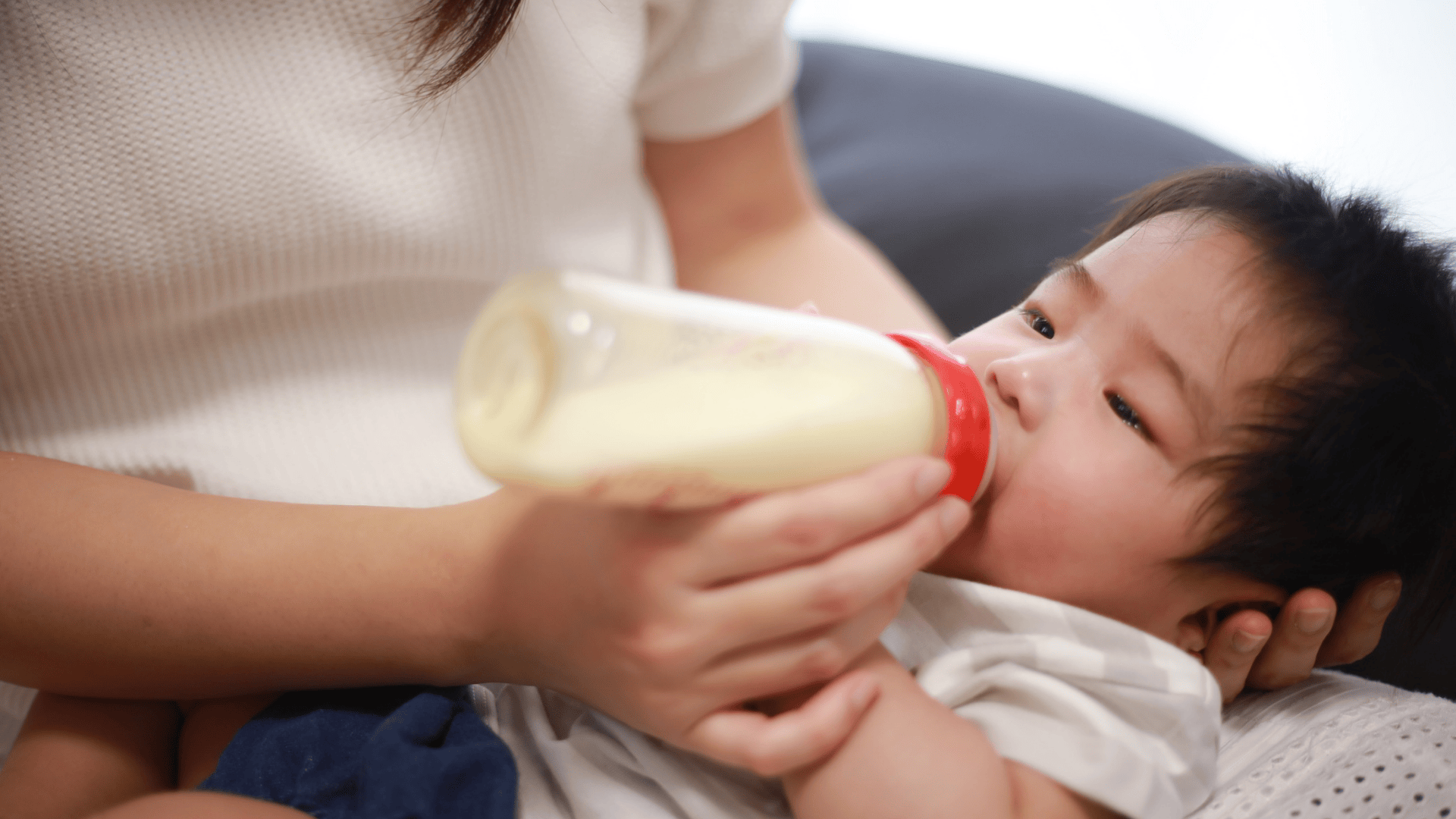Remember how stressful it felt when a baby cried nonstop from gas. You probably feel tired, worried, and unsure of what to do.
The truth is, not every formula digests the same, and sometimes the one you choose makes a big difference in your baby’s comfort. That’s why knowing your options matters.
In this blog, I’ll walk you through why babies get gassy, when it might be time to consider a different formula, and the best formula for gassy babies that parents often find helpful.
Why Do Babies Get Gassy?
Gas is common in babies because their digestive systems are still developing. Swallowing air during feeding or crying makes it worse.
Most of the time, gas is normal and causes only mild fussiness. Signs like constant crying, poor feeding, or blood in stool may point to a bigger issue.
Gas is different from colic, reflux, and allergies. Gas usually eases with burping or passing wind.
Colic causes long crying spells, reflux leads to frequent spit-ups, and allergies may show rashes or blood in stool.
Best Types of Formula for Gassy Babies
Parents are often overwhelmed by formula choices, and gas makes the decision even tougher. The key is knowing how each type works in your baby’s digestion and which symptoms it can actually help.
1. Reduced Lactose & Lactose-Free Formulas
Many babies struggle to break down lactose fully, which can lead to bloating, fussiness, and excess gas.
These formulas cut down or remove lactose, making them easier on sensitive tummies without changing much else in the nutrition profile. Popular examples include Enfamil Sensitive and Similac 360 Total Care Sensitive.
2. Partially Hydrolyzed Formulas
These formulas break milk proteins into smaller pieces, making digestion gentler and faster for young stomachs.
Parents often choose them for everyday gas and fussiness since they’re easier to digest but not as specialized or expensive as hypoallergenic formulas. Trusted brands include Gerber, Good Start, GentlePro, and Enfamil Gentlease.
3. Hypoallergenic/Extensively Hydrolyzed Formulas
Babies with a cow’s milk protein allergy often need a special formula. These formulas break proteins down almost completely.
This reduces the chance of reactions that can cause gas, skin rashes, or reflux-like symptoms. Common options include Enfamil Nutramigen, Similac Alimentum, and Gerber Extensive HA.
4. Probiotic-Enhanced Formulas
Probiotics are “good” bacteria that help balance gut health. They can reduce gas and make digestion smoother. Parents often try these formulas when regular “sensitive” options aren’t enough.
Probiotics may also support long-term digestive comfort. Examples include Gerber, Good Start GentlePro, and Similac Pro-Total Comfort.
5. Goat’s Milk-Based Formulas
Goat’s milk has naturally gentler proteins and a slightly different fat structure, making it easier for some babies to tolerate than cow’s milk formulas.
While not allergy-proof, they may help babies who struggle with standard options. Examples include Kendamil Goat Milk and Kabrita USA Goat Milk.
Top Recommended Formulas

Below are some of the top recommended formulas, with their key features, price range, and what parents are saying:
| Brand | Type | Key Features | Average Price (approx.) | Reviews |
|---|---|---|---|---|
| Enfamil Gentlease | Reduced Lactose / Gentle | Easier-to-digest proteins, reduce gas, blend of DHA & nutrients | $35 per 19.5 oz can | 4.7/5 – Parents report less gas and fussiness |
| Similac 360 Total Care Sensitive | Reduced Lactose / Sensitive | Lactose sensitivity support, immune blend, closest to breast milk claim | $35 per 20 oz can | 4.6/5 – Liked for sensitivity support and tolerance |
| BYHEART Infant Formula Powder | Specialty / Comfort | Organic European formula, designed for colic and gas relief | $40 per 600g | 4.8/5 – Trusted European option for digestion issues |
| Goat’s Milk Based | Goat milk proteins, easier digestion, whole milk base, non-GMO | $45 per 800g | 4.7/5 – Positive feedback on easier digestion | |
| Nutramigen | Hypoallergenic / Extensively Hydrolyzed | Extensively hydrolyzed proteins, for cow’s milk protein allergy, reduce colic | $75 per 27.8 oz | 4.8/5 – Effective for allergy-related tummy troubles |
| Partially Hydrolyzed | Gentle proteins, probiotics for gut health, support brain & eye development | $30 per 20 oz | 4.6/5 – Gentle choice with added probiotics | |
| Amazon Brand Gentle Formula | Affordable, gentle formula, reduced lactose, supports digestion | $20 per 21 oz | 4.5/5 – Affordable and well tolerated |
Please keep in mind that the exact price may vary.
How to Choose the Right Formula
Picking the best formula depends on your baby’s needs and your family’s situation. A few key factors can guide your choice.
Factors to Consider
Choosing a formula isn’t just about nutrition. Parents often weigh practical things that can make feeding easier and more reliable.
- Budget: Specialized and imported formulas can be costly, while store brands or gentle blends are often more affordable.
- Tolerance: Pay close attention to how your baby reacts. Gas, fussiness, or rashes may signal the need for a different type.
- Availability: Pick a formula that’s easy to find in stores or online to prevent sudden shortages.
Some families also prefer organic options, like HiPP Comfort or Kendamil Goat, if it matches their values. Keeping these points in mind helps you balance comfort, cost, and convenience.
When to Try a Different Type
Sometimes a baby’s body shows clear signs that the current formula isn’t the right match. Watch for these signals:
- Constant gas or fussiness: Ongoing discomfort after feeding may mean the formula is too hard on your baby’s stomach.
- Frequent spit-ups or reflux: If feeding leads to repeated spit-ups, the formula might not be digesting well.
- Skin rashes, diarrhea, or blood in stools: Visible reactions often point to an allergy or sensitivity needing medical attention.
- No improvement after 1–2 weeks: If symptoms stay the same, your baby may need a gentler or allergy-friendly formula.
Switching should always be guided by a pediatrician. They can confirm whether a gentle, lactose-free, or hypoallergenic option is the best fit.
Safe Formula Switching & Feeding Tips
Switching formulas and feeding adjustments can help reduce gas and fussiness. Here are the most important tips to follow:
- Transition slowly: Mix old and new formula in stages over 7–10 days to avoid stomach upset.
- Wait for results: Give at least one week before judging if a formula is helping.
- Choose the right bottle: Anti-colic bottles reduce air intake, which can cut down on gas.
- Burp often: Pause during and after feedings to release trapped air.
- Feed upright: Keep your baby slightly upright to improve digestion and reduce spit-ups.
These steps can make formula changes smoother and feeding more comfortable for your baby.
Conclusion
Finding the right formula for a gassy baby can take time, patience, and a little trial and error. Every baby digests differently, so what works for one may not work for another.
While gas is often normal, ongoing discomfort, fussiness, or changes in stool may point to something more. That’s why it’s important to involve your pediatrician before making any formula changes.
They can help identify sensitivities, rule out allergies, and recommend the best options for your baby’s health and comfort.
Remember, your goal is a happy, well-fed baby who feels better after every meal. If you found this guide helpful, leave a comment below and share this blog with other parents.










